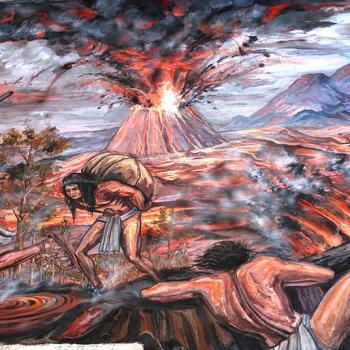Wink reclaims the divine realm as central to human existence by offering new ways of understanding our world in theological terms. He reformulates ancient concepts, such as God and the devil, heaven and hell, angels and demons, principalities and powers, in light of our modern experience. He helps us see heaven and hell, sin and salvation, and the powers that shape our lives as tangible parts of our day-to-day experience, rather than as mysterious phantoms. Based on his reading of the Bible and analysis of the world around him, Wink creates a whole new language for talking about and to God. Equipped with this fresh world view, we can embark on a new relationship with God and our world into the next millennium.
On "Science and Religion"
Christianity and Science: Toward a Theology of Nature by John F. Haught (2007).
Religion and Science do not have to conflict. Haught should how they can fruitfully supplement one another and be mutually-informative.
On "Loving God"
Daniel Wolpert, Creating a Life With God: The Call of Ancient Prayer Practices (2003).
Daniel introduces you to twelve prayer practices that invite you to solitude and silence, to use your mind and imagination, to use your body and your creativity, and to connect with nature and community. You'll meet "traveling companions" from history like Ignatius and Julian of Norwich -- individuals and groups who illuminate these prayers. You'll discover how classical approaches to God can deepen your prayer life today. An appendix offers step-by-step instructions for praying the Jesus Prayer and the prayer of Examen, for walking the labyrinth, from praying with your body, and more -- whether individually or in a group.
On "Pragmatism"
Diana Butler Bass, A People's History of Christianity: The Other Side of the Story (2009).
In this panoramic view of two millennia of Christian history, Butler Bass (Christianity for the Rest of Us) attempts to give contemporary progressive (the author prefers the term "generative") Christians a sense of their family history, refracted through little known as well as famous men and women whose work within and outside the institutional church fueled sometimes "alternative" practices as they tried to follow Jesus the Prophet. "Without a sense of history, progressive Christianity remains unmoored," argues Butler Bass, a former columnist for the New York Times syndicate. Organized chronologically, each section of the book includes a chapter on religious observance and one on social justice, illuminating the author's conviction that authentic Christianity can be discovered in the practice of loving God and neighbor. Laced with stories from the author's own life and with contemporary examples of "generative Christianity," Butler Bass's version of Christian history includes familiar figures like the fourth-century church father Gregory of Nyssa and lesser-known individuals like the 19th century American abolitionist Maria Stewart.
Bass's primary goal in this book is to restore what she calls "Great Command Christianity," a reference to the tale of the Good Samaritan and Jesus' subsequent admonition to "go and do likewise." Bass explores the myriad ways in which that teaching has been interpreted and embodied. The result is sometimes subversive and often joyful: In Bass's telling, Jesus is a "religious revolutionary" who led a People's Crusade of "humility, hospitality, and love." Readers seeking a scholarly approach may want to look elsewhere; the writing here is deeply personal and airily structured. What emerges is a persuasive argument that the real traditions of the church are "faith, hope, and love entwined."
Geez Magazine (www.geezmagazine.org)
Because it's time we untangle the narrative of faith from the fundamentalists, pious self-helpers and religio-profiteers. And let's do it with holy mischief rather than ideological firepower. We'll explore the point at which word, action and image intersect, and then ignite. So let's blaspheme the gods of super-powerdom, instigate spiritual action campaigns and revamp that old Picture Bible. We've set up camp in the outback of the spiritual commons. A bustling spot for the over-churched, out-churched, un-churched and maybe even the un-churchable. A location just beyond boring bitterness. A place for wannabe contemplatives, front-line world-changers and restless cranks. A place where the moon shines quiet, instinct runs mythic and belief rides a bike (or at least sits on the couch entertaining the possibility).
L'Arche (www.larcheusa.org)
A sign of hope to the wider world of the essential values of the heart, L'Arche communities, family-like homes where people with and without disabilities share their lives together, give witness to the reality that persons with disabilities possess inherent qualities of welcome, wonderment, spirituality, and friendship. Perhaps an extraordinary notion in our fast-paced and consumer-driven society, L'Arche believes that these qualities, expressed through vulnerability and simplicity, actually make those with a disability our real teachers about what is most important in life: to love and to be loved. From the first community begun in France in 1964, many communities have developed in various cultural and religious traditions around the world.)




